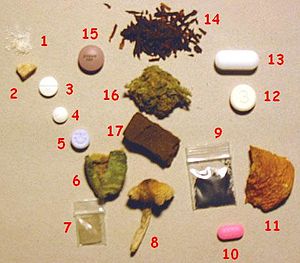
Back Psigotropiese middel Afrikaans دواء نفسي المفعول Arabic Psixotrop maddə Azerbaijani Психоактивно вещество Bulgarian Psicòtrop Catalan دەرمانی کاریگەریی دەروونی CKB Psychoaktivní droga Czech Psykoaktivt stof Danish Psychotrope Substanz German Ψυχοδραστική ουσία Greek

- Cocaine
- Crack cocaine
- Methylphenidate (Ritalin)
- Ephedrine
- MDMA (ecstasy)
- Peyote (mescaline)
- LSD blotter
- Psilocybin mushroom (Psilocybe cubensis)
- Salvia divinorum (salvinorin A)
- Diphenhydramine (Benadryl) (Unscheduled drug)
- Amanita muscaria mushroom (muscimol)
- Tylenol 3 (acetaminophen/codeine)
- Codeine with muscle relaxant
- Pipe tobacco (nicotine) (Unscheduled drug)
- Bupropion (Unscheduled drug)
- Cannabis (THC)
- Hashish (THC)


A psychoactive drug, mind-altering drug, or consciousness-altering drug is a chemical substance that changes brain function and results in alterations in perception, mood, consciousness, cognition, or behavior.[1] This category of drugs includes psychotropic drugs (a term often used interchangeably with psychoactive drug) and narcotic drugs. These substances may be used medically; recreationally; to purposefully improve performance or alter one's consciousness; as entheogens for ritual, spiritual, or shamanic purposes;[2] or for research, including psychedelic therapy. Some categories of psychoactive drugs, which have therapeutic value, are prescribed by physicians and other healthcare practitioners.[3] Examples include anesthetics, analgesics, anticonvulsant and antiparkinsonian drugs as well as medications used to treat neuropsychiatric disorders, such as antidepressants, anxiolytics, antipsychotics, and stimulant medications. Some psychoactive substances may be used in the detoxification and rehabilitation programs for persons dependent on or addicted to other psychoactive drugs.[4][5]
Psychoactive substances often bring about subjective changes in consciousness and mood (although these may be objectively observed) that the user may find rewarding and pleasant (e.g., euphoria or a sense of relaxation) or advantageous in an objectively observable or measurable way (e.g. increased alertness), thus the effects are reinforcing to varying degrees.[6] Substances which are rewarding and thus positively reinforcing have the potential to induce a state of addiction – compulsive drug use despite negative consequences.[7] In addition, sustained use of some substances may produce physical or psychological dependence or both, associated with somatic or psychological-emotional withdrawal states respectively.[7] Drug rehabilitation attempts to reduce addiction, through a combination of psychotherapy, support groups, and other psychoactive substances. Conversely, certain psychoactive drugs may be so unpleasant that the person will never use the substance again. This is especially true of certain deliriants (e.g. Jimson weed), powerful dissociatives (e.g. Salvia divinorum), and classic psychedelics (e.g. LSD, psilocybin), in the form of a "bad trip".
Psychoactive drug misuse, dependence, and addiction have resulted in legal measures and moral debate.[8] Governmental controls on manufacture, supply, and prescription attempt to reduce problematic medical drug use; worldwide efforts to combat trafficking in psychoactive drugs are commonly termed the "war on drugs". Ethical concerns have also been raised about the overuse of these drugs clinically and about their marketing by manufacturers.[9] Popular campaigns to decriminalize[10] or legalize the recreational use of certain drugs (e.g., cannabis) are also ongoing.
- ^ "CHAPTER 1 Alcohol and Other Drugs". The Public Health Bush Book: Facts & approaches to three key public health issues. ISBN 0-7245-3361-3. Archived from the original on 2015-03-28.
- ^ Miller C, Lewis J. "Uses of Psychoactive Drugs". Open Library: Press Books. Retrieved 2 December 2023.
- ^ Levine RJ (1991). "Medicalization of Psychoactive Substance Use and the Doctor-Patient Relationship". The Milbank Quarterly. 69 (4): 623–640. doi:10.2307/3350230. ISSN 0887-378X. JSTOR 3350230. PMID 1806804.
- ^ Rockville (2006). "4 Physical Detoxification Services for Withdrawal from Specific Substances". Detoxification and Substance Abuse Treatment: 4 Physical Detoxification Services for Withdrawal From Specific Substances.
{{cite book}}:|journal=ignored (help) - ^ "Substance Use Disorder (SUD): Management and Treatment". Cleveland Clinic. Retrieved 2 December 2023.
- ^ "Drugs (psychoactive)". World Health Organization. Retrieved 2 December 2023.
- ^ a b "Substance use and addiction". Canadian Mental Health Association. Retrieved 2 December 2023.
- ^ Frank LE, Nagel SK (February 2017). "Addiction and Moralization: the Role of the Underlying Model of Addiction". Neuroethics. 10 (1): 129–139. doi:10.1007/s12152-017-9307-x. PMC 5486499. PMID 28725284. Retrieved 2 December 2023.
- ^ Mastroianni PC, Noto AR, Galduróz JC (2008). "Psychoactive drug advertising: analysis of scientific information". Revista de Saude Publica. 42 (3). 42(3): 529–35. doi:10.1590/s0034-89102008005000023. hdl:11449/70529. PMID 18438590. Retrieved 2 December 2023.
- ^ Zhang M. "Missouri's marijuana legalization campaign is splitting the weed world". POLITICO. Retrieved 2023-01-25.
© MMXXIII Rich X Search. We shall prevail. All rights reserved. Rich X Search